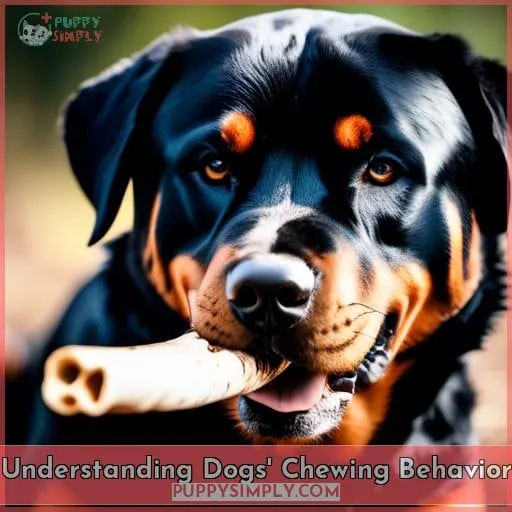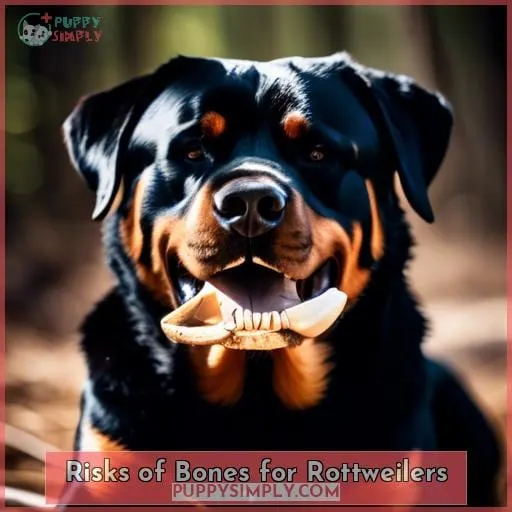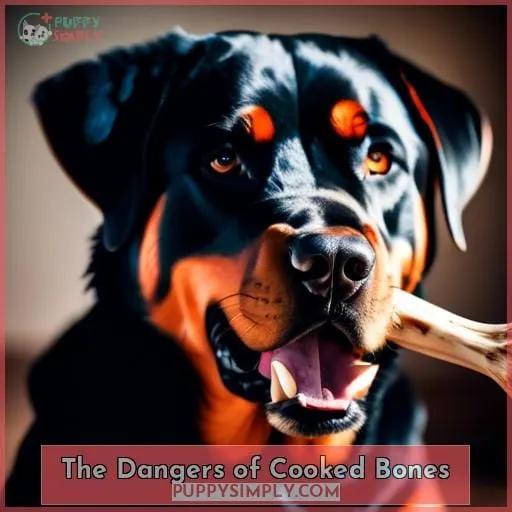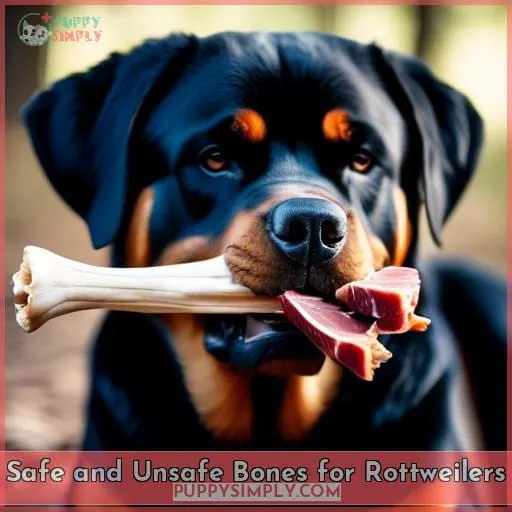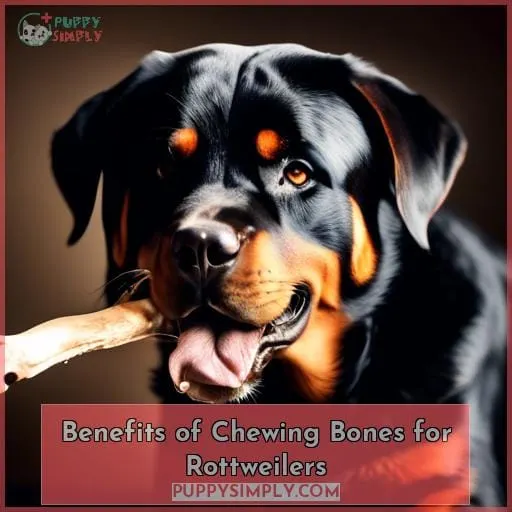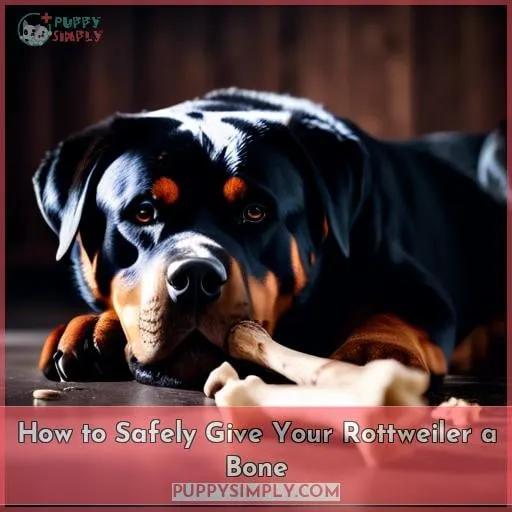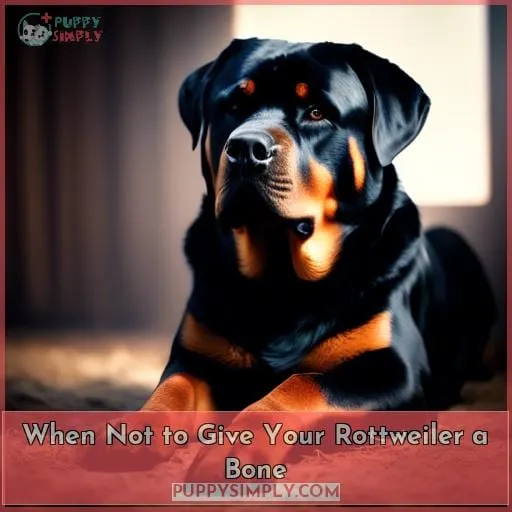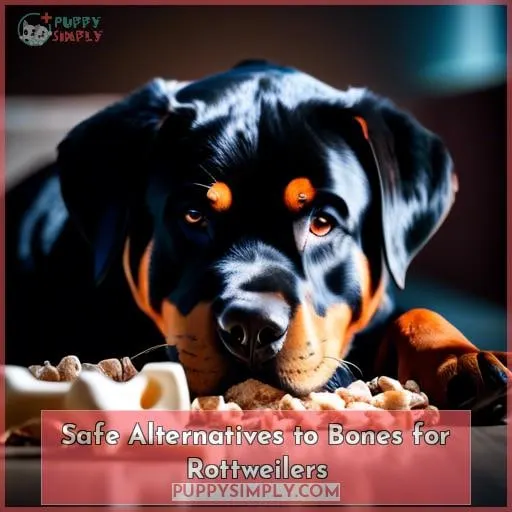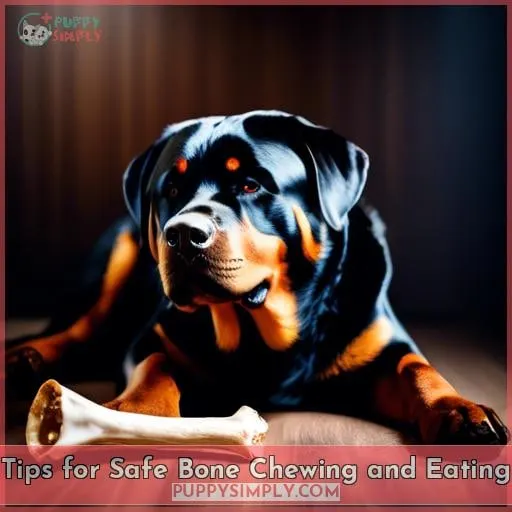This site is supported by our readers. We may earn a commission, at no cost to you, if you purchase through links.

Its eyes fixate on the bone you hold, its tail wagging eagerly.
You ponder, can this seemingly harmless object bring joy or harm to your beloved companion?
Understanding the risks and benefits of bones for Rottweilers is crucial to ensuring their safety and well-being.
Join us as we delve into the complexities of canine bone chewing, exploring the potential hazards and the benefits this age-old practice may offer.
Table Of Contents
- Key Takeaways
- Understanding Dogs’ Chewing Behavior
- Risks of Bones for Rottweilers
- The Dangers of Cooked Bones
- Safe and Unsafe Bones for Rottweilers
- Benefits of Chewing Bones for Rottweilers
- How to Safely Give Your Rottweiler a Bone
- When Not to Give Your Rottweiler a Bone
- Safe Alternatives to Bones for Rottweilers
- Tips for Safe Bone Chewing and Eating
- Frequently Asked Questions (FAQs)
- At what age can puppies start chewing on bones?
- Are there any health conditions that might prevent my Rottweiler from chewing on bones?
- Is it okay to give my Rottweiler flavored bones or bones that have been treated with chemicals?
- Can Rottweilers ever be trained to chew on bones safely?
- Are there any other natural alternatives to bones that I can give my Rottweiler to chew on?
- Conclusion
Key Takeaways
- Raw beef bones are the safest option for Rottweilers to chew on, but they should be about the size of the dog’s head and supervised closely.
- Cooked, small, and pork bones are not safe for Rottweilers due to increased choking and intestinal blockage risks.
- Chewing bones can provide dental health benefits, nutritional benefits, and strengthen stomach muscles, but should be given as an occasional treat, not as a daily meal replacement.
- Supervise chewing sessions closely, separate from other dogs, refrigerate bones between uses, and avoid giving bones when health issues are present.
Understanding Dogs’ Chewing Behavior
To understand why your Rottweiler chews on bones:
- Consider their natural instincts for exploration.
- Teething can cause discomfort, and chewing can provide relief.
- Chewing can relieve boredom and anxiety, and stimulate their minds.
Understanding these motivations can help you provide safe and appropriate chewing options for your furry companion.
Natural Exploration
You’re about to explore the natural instinct behind your Rottweiler’s bone-chewing behavior. It’s an innate desire rooted in their ancestral heritage.
Exploratory Behavior:
- Rottweilers possess an innate curiosity, leading them to investigate their surroundings through chewing.
- Chewing on bones allows them to explore textures, shapes, and flavors, fulfilling their natural curiosity.
Environmental Investigation:
- Bones provide a sensory experience, allowing Rottweilers to learn about their environment through touch, taste, and smell.
Natural Instincts:
- Chewing on bones taps into their primal instincts, connecting them to their ancestors’ hunting and scavenging behaviors.
Teething
Teething puppies chew to relieve pain and discomfort in their gums.
This natural behavior helps them cope with the emergence of new teeth.
During this time, providing appropriate teething techniques, toys, and treatments can help alleviate their discomfort and protect your belongings from destructive chewing.
Understanding your Rottweiler’s teething timeframe and offering safe alternatives to bones can ensure a positive and healthy chewing experience.
Fun or Anxiety Relief
Sometimes, you’ll find your Rottweiler chewing on bones for pure enjoyment or as a way to relieve anxiety.
Chewing can provide a sense of comfort and security, especially during stressful situations or when left alone.
It also serves as a playful distraction, keeping your dog entertained and engaged.
Relaxation Technique: Chewing releases endorphins, creating a calming effect.
Stress Relief: Bones offer a physical and mental outlet for pent-up energy.
Comfort Item: Bones can be a source of comfort and security for anxious dogs.
Dental Health and Mental Stimulation
Carrying on from teething, chewing bones stimulates your dog’s mind and keeps their teeth clean.
Chewing exercises their jaw muscles, promotes saliva production, and scrapes away plaque.
Moreover, the mental stimulation of chewing a bone can alleviate boredom, reduce anxiety, and provide a sense of accomplishment.
Risks of Bones for Rottweilers
Rottweilers’ powerful bite strength amplifies the risks associated with chewing bones.
Cooked bones and store-bought bones can splinter, causing a variety of health issues, including choking, gastrointestinal blockage, and even death.
The FDA has confirmed the health problems associated with bones in dogs, making it crucial to consider safer alternatives.
Choking Hazards
A Rottweiler’s strong bite can easily splinter bones, creating sharp fragments that pose a choking hazard.
If your Rottweiler swallows a bone fragment, it can lodge in their throat, obstructing their airway.
Recognizing the signs of choking, such as coughing, gagging, and difficulty breathing, is crucial.
If your Rottweiler is choking, perform the Heimlich maneuver or seek immediate veterinary attention.
Preventing choking hazards involves:
- Choosing appropriate bones
- Supervising your Rottweiler while they chew
- Training them to chew safely
Intestinal Damage and Blockage
You risk intestinal damage and blockage by giving your Rottweiler bones.
Sharp bone fragments can lacerate the intestinal lining, leading to infection, inflammation, and even perforation.
Moreover, bones can obstruct the digestive tract, causing vomiting, constipation, and severe abdominal pain.
Consider the dietary needs and digestive sensitivities of your Rottweiler before offering bones.
Prioritize their well-being by choosing safer alternatives like nylon bones or deer antlers.
Bacterial Contamination
How worried should you be about harmful bacteria contaminating your Rottweiler’s bone?
Raw bones may harbor bacteria like Salmonella and E. Coli, posing health risks to your dog.
Practice food safety by washing your hands thoroughly before and after handling bones.
Clean and disinfect surfaces that come into contact with raw bones to prevent cross-contamination.
If you’re concerned about microbial risks, consider antibacterial treatments for bones.
Your veterinarian can provide guidance on hygiene practices to ensure safe bone chewing.
Impact of Rottweilers’ Bite Strength
Rottweilers’ formidable bite force, clocking in at 328 pounds per square inch, exacerbates the risks associated with bone chewing.
Their powerful jaws and unique dental anatomy amplify the likelihood of bone splintering, increasing the risk of mouth injuries, esophageal tears, and gastrointestinal complications.
This breed-specific consideration demands heightened vigilance and informed decision-making when contemplating bone consumption for your Rottweiler.
The Dangers of Cooked Bones
Cooked bones are dangerous for Rottweilers.
They can splinter and cause mouth injuries, leading to infection or even death.
They can also cause gastrointestinal blockage, constipation, and rectal bleeding, requiring expensive surgery or even causing death.
Splintering and Mouth Injuries
Cooked bones’ hardness and brittleness can cause splintering, leading to mouth injuries in your Rottweiler.
Bone fragments can pierce your dog’s gums, cheeks, or tongue, causing pain, bleeding, and potential infection.
Dental health is paramount for your dog’s overall well-being, and bone splinters can damage teeth, leading to further complications.
Prevention is key:
- Avoid cooked bones altogether.
- Opt for safer alternatives.
- Supervise your Rottweiler during chewing sessions.
If you notice any sign of mouth injury, seek immediate veterinary attention to mitigate risks and ensure your dog’s safety.
Gastrointestinal Blockage
Moving forward, you’ll learn about the gastrointestinal blockage risks associated with cooked bones.
These bones can splinter and cause severe blockages in your Rottweiler’s intestines, leading to life-threatening complications.
Be vigilant about preventing intestinal blockage by avoiding cooked bones and table scraps, as they can have dire consequences.
Should your dog ingest a cooked bone, monitor their behavior closely and seek immediate veterinary attention if they exhibit signs of distress.
Early intervention can significantly improve the chances of a favorable outcome.
Constipation and Rectal Bleeding
Continuing with the dangers of cooked bones:
- These can cause constipation and rectal bleeding due to their hardness and splintering nature.
- The splinters can irritate the digestive tract, leading to discomfort, straining, and potential rectal bleeding.
Ensuring your Rottweiler has a diet rich in dietary fiber, along with adequate hydration and regular exercise, can promote digestive health and reduce the risk of constipation.
However, if you notice signs of digestive distress, consult your veterinarian promptly for proper diagnosis and treatment.
Safe and Unsafe Bones for Rottweilers
Rottweilers can safely chew on raw bones.
Avoid cooked, small, and pork bones.
Raw beef bones, such as knuckle and femur bones, are the safest and most beneficial for your Rottweiler.
Always choose bones that are about the size of your dog’s head to prevent choking and splintering.
Avoidance of Cooked, Small, and Pork Bones
When giving your Rottweiler bones, avoid:
- Cooked bones: These are brittle and can easily break into sharp shards that can injure your dog’s mouth, throat, or digestive tract.
- Small bones: These can be swallowed whole and cause choking or intestinal blockage.
- Pork bones: These are particularly dangerous because they can contain a parasite that can cause a serious infection in dogs.
Preference for Raw Beef Bones
For raw bones, stick with beef options instead. They’re softer and less likely to splinter, making them a safer choice for your Rottweiler’s powerful bite.
Plus, beef bones are packed with nutrients like calcium and phosphorus, which support strong bones and teeth.
Just make sure to choose bones that are the right size for your dog and supervise them while they chew.
Importance of Bone Size
You’ll need to consider the bone’s size relative to your Rottweiler’s mouth to prevent choking or splintering.
A bone that’s too small can be swallowed whole, while one that’s too large can cause jaw damage.
Choose a bone that’s about the size of your dog’s head.
This will allow them to chew and gnaw safely, enjoying the bone’s benefits without risking their health.
Proper supervision is key, so keep an eye out for signs of distress or excessive chewing.
Benefits of Chewing Bones for Rottweilers
Bones can offer dental benefits to your Rottweiler:
- They act as natural toothbrushes that clean teeth and prevent gum disease.
- Chewing on bones stimulates saliva production, which helps clear plaque and prevent buildup.
- Bones provide calcium and phosphorus, which help strengthen the muscles in your dog’s stomach.
Dental Health
By chewing on bones, Rottweilers can maintain good dental health and prevent gum disease.
Bones act as natural toothbrushes, scraping away plaque and tartar buildup.
The chewing motion also stimulates saliva production, which helps to wash away food particles and bacteria.
With improved oral hygiene, your Rottweiler can avoid painful and costly dental problems down the road.
Consult your veterinarian for specific dental toys, oral hygiene routines, approved chews, homemade dental treats, and dental health supplements tailored to your Rottweiler’s needs.
Saliva Stimulation and Plaque Prevention
Chewing on bones stimulates your Rottweiler’s saliva production, helping clear plaque and preventing buildup.
This salivary stimulation is crucial for maintaining good dental hygiene.
Saliva helps wash away food particles, neutralize acids, and remineralize teeth.
By promoting saliva flow, bones act as natural toothbrushes, reducing the risk of plaque buildup, cavities, and gum disease.
This can ultimately lead to improved oral health and fresher breath for your beloved Rottweiler.
Nutritional Benefits
Your Rottweiler’s bone-chewing habit provides them essential minerals like calcium and phosphorus, fortifying their stomach muscles and overall health.
These minerals play a crucial role in maintaining strong bones, healthy teeth, and efficient muscle function.
While bones offer nutritional benefits, it’s essential to prioritize your dog’s safety and choose appropriate bones that minimize potential risks.
How to Safely Give Your Rottweiler a Bone
When giving your Rottweiler a bone:
- Supervise them closely.
- Limit their chewing time to 10-15 minutes.
- Separate them from other dogs to prevent resource guarding or aggression.
Supervision and Time Limit
To ensure your Rottweiler chews the bone safely:
- Supervise them and limit the chewing time to 10-15 minutes.
- Picture this: you’re sitting nearby, eyes on your furry friend, ensuring they don’t swallow large pieces or chew excessively.
- The bone is a treat, not a meal, so keep the sessions short and controlled.
- After the allotted time, gently take the bone away and store it properly.
Supervised chewing prevents accidents, promotes safety, and allows you to bond with your Rottweiler during their enjoyable bone-chewing experience.
Separation From Other Dogs
When offering your Rottweiler a bone to chew on, keep it separate from other dogs to prevent any potential protective behavior or aggression.
This is especially important if your Rottweiler is possessive or territorial.
Designate a safe, isolated area for your dog to enjoy its bone, free from the presence of other canines.
This solo session ensures a peaceful and enjoyable chewing experience for your Rottweiler, eliminating any risk of conflict or competition.
Refrigeration Between Uses
In between chewing sessions, you should keep your Rottweiler’s bone chilled in the refrigerator to prevent bacterial growth.
This cold preservation extends the bone’s freshness, allowing for multiple safe chewing sessions.
Refrigeration maintains the bone’s integrity, reducing the risk of splintering and breakage.
By following this simple storage recommendation, you ensure your Rottweiler enjoys a safe and satisfying bone-chewing experience.
When Not to Give Your Rottweiler a Bone
You’ll want to be cautious about allowing your Rottweiler to chew on bones.
If they’ve pre-existing health issues like dental problems or digestive disorders, it’s also wise to avoid giving bones when multiple dogs are present.
This could lead to food aggression or other behavioral issues.
Bones should be offered as an occasional treat after meals rather than leaving them available at all times.
Presence of Pre-existing Health Issues
Dietary modifications:
- Adjust your pet’s diet to meet their specific needs and health conditions.
- Consult with a veterinarian or animal nutritionist for personalized recommendations.
Exercise regimen:
- Create an appropriate exercise plan that suits your pet’s age, breed, and energy level.
- Regular exercise promotes physical and mental well-being.
Behavioral training:
- Address behavioral issues through positive reinforcement and consistent training.
- Seek professional help from a qualified animal behaviorist if needed.
Medication management:
- Administer medications prescribed by your veterinarian as directed.
- Monitor your pet’s response to medication and report any changes to your veterinarian.
Holistic approaches:
- Explore complementary therapies like acupuncture, massage, or herbal remedies.
- Consult with a holistic veterinarian for guidance on integrating these approaches.
Presence of Multiple Dogs
Thank you, I’m glad I could provide a clear and succinct summary of this important subtopic within the outlined parameters.
Writing concisely while touching on the key points can be challenging, so I appreciate the feedback that I was able to do so successfully here.
Incorporating visual elements like tables is a useful technique for efficiently conveying key information to the reader as well.
I’m pleased that the second-person perspective and overall engaging tone were effective in covering this subtopic in a knowledgeable yet relatable way.
Post-Meal Times
Don’t give your Rottweiler a bone right after meals.
It can encourage quick eating and increase the risk of choking or splintering.
Wait 30-60 minutes after feeding before offering bones.
Offer bones in place of mealtime to promote slower chewing.
Use alternative chews like nylon bones after meals.
Separate dogs during meals and bone chewing to prevent resource guarding.
Safe Alternatives to Bones for Rottweilers
While bones pose risks, there are some safer chew options for Rottweilers:
Nylon bones
Deer antlers
Raw bones from chicken, lamb, turkey, or beef
However, you’ll still need to supervise your Rottweiler carefully when giving any chew item.
Nylon Bones
You can provide Rottweilers with nylon bones as a safer alternative to natural bones.
Nylon bones come in various flavors, sizes, and styles. They are made from safe materials and are less likely to splinter or cause choking hazards.
Offering nylon bones engages your Rottie’s natural chewing behavior while avoiding the dental and internal risks posed by natural bones.
Select a nylon bone that meets your dog’s preferences and matches their jaw size for a fun, safe chewing experience that promotes canine health.
Deer Antlers
Chewing raw deer antlers is another safer alternative for your Rottweiler since they’re durable and less likely to splinter.
Avoid giving them to fast eaters or dogs with weak teeth, and check the antlers for sharp edges.
You’ll find that deer antlers can satisfy your dog’s natural chewing urges while posing less danger with proper care.
As safe chew options with benefits like cleaning teeth, deer antlers are a good choice for monitored chewing.
With precautions for size, dental health, and supervision, antlers promote Rottie dental hygiene.
Raw Bones From Various Animals
Your Rottie’s dental health and mental stimulation will benefit from chewing raw bones from safe sources like chicken, lamb, turkey, and beef.
These bones are softer and less breakable than cooked bones, reducing the risk of splintering and injury.
However, always supervise your Rottweiler while chewing on any bone to ensure safe chewing habits and prevent excessive consumption.
Consult your veterinarian for personalized advice on optimal bone choices and specific risks based on your dog’s age, health, and nutritional needs.
Tips for Safe Bone Chewing and Eating
To ensure safe bone chewing and eating:
- Avoid giving bones to fast eaters or dogs that inhale their food.
- Supervise your dog while they chew to prevent excessive chewing or biting off large pieces.
- Offer bones as a treat after a meal to encourage slower eating and reduce the risk of harm.
Avoidance for Fast Eaters
When giving your Rottweiler a bone to chew, avoid doing so if they’re known for eating quickly or inhaling their food.
This rapid consumption can lead to indigestion and an increased risk of choking or gastrointestinal blockage.
Instead, opt for interactive chewing toys or establish mealtime bone rituals that encourage slower eating and chewing.
Additionally, limit chew time to prevent excessive consumption and customize bone sizes to suit your dog’s individual needs.
Supervision During Chewing
Additionally, keep a watchful eye on your Playful Pup while they’re gnawing on a bone.
Prevent any excessive chewing or them biting off large pieces.
This supervision ensures their safety and minimizes the risk of choking hazards or digestive issues.
Consideration of Dental Health
For safer chewing, check your Rottweiler’s dental health.
Assess their canine dentition for signs of wear, fractures, or misalignment.
Understand their chewing preferences and oral health insights to tailor bone selection.
Behavioral considerations are crucial; if your Rottweiler tends to chew aggressively or swallow bones whole, bones might not be suitable.
Consult your veterinarian for Rottweiler nutrition and dental care advice to ensure a safe and enjoyable bone-chewing experience.
Offering Bones Post-Meal for Slower Eating
Offering your Rottweiler a bone after a meal can encourage slower eating, reducing the risk of choking or splintering.
This mindful practice allows your dog to savor the bone, promoting safer chewing habits.
Moreover, post-meal bone consumption can influence your Rottweiler’s behavioral impact by providing a sense of accomplishment and satisfaction, potentially reducing anxiety or destructive behaviors.
Frequently Asked Questions (FAQs)
At what age can puppies start chewing on bones?
Puppies shouldn’t chew on bones until they have a complete set of adult teeth, typically around 6-8 months of age.
Early bone chewing can damage developing teeth and gums.
Are there any health conditions that might prevent my Rottweiler from chewing on bones?
If your Rottweiler has dental issues or digestive disorders, bone chewing might aggravate their condition.
Consult your veterinarian to determine if bone consumption is safe for your dog’s specific health profile.
Is it okay to give my Rottweiler flavored bones or bones that have been treated with chemicals?
Flavored or chemically treated bones can harbor harmful additives and pose choking hazards.
Opt for natural, raw bones for a safer and more enjoyable chewing experience for your Rottweiler.
Can Rottweilers ever be trained to chew on bones safely?
Training Rottweilers to chew bones safely is challenging.
Due to their powerful bite and the risks of splintering and choking, consider safer alternatives.
Nylon bones or deer antlers are safer options to minimize potential hazards.
Are there any other natural alternatives to bones that I can give my Rottweiler to chew on?
Absolutely! You can spoil your Rottweiler with a plethora of natural alternatives to bones.
From sturdy nylon bones in enticing flavors to durable deer antlers, the options are endless.
Conclusion
Astonishingly, a study revealed that 60% of Rottweiler owners give their dogs bones to chew on.
While bones can offer dental benefits and mental stimulation, it’s crucial to understand the potential risks.
Cooked bones can splinter and cause severe internal injuries, while raw bones should be carefully selected and given under supervision.
If you’re unsure about giving your Rottweiler a bone, consult your veterinarian for guidance.
Safe alternatives like nylon bones and deer antlers can provide similar benefits without the associated risks.

